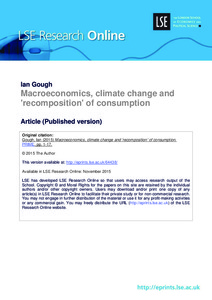Macroeconomics, climate change and 'recomposition' of consumption
"Macroeconomic policy should be evaluated, he says, and devised according to sustainability criteria alongside economic and social criteria. Economic goals whether growth of GDP productivity or competitiveness, should not trump equity/justice or sustainability. But nor should environmental goal...
| Main Author: | |
|---|---|
| Institution: | ETUI-European Trade Union Institute |
| Format: | TEXT |
| Language: | English |
| Published: |
London
2015
Prime Economics |
| Subjects: | |
| Online Access: | https://www.labourline.org/KENTIKA-19108462124919266449-Macroeconomics,-climate-change.htm |
| Summary: | "Macroeconomic policy should be evaluated, he says, and devised according to sustainability criteria alongside economic and social criteria. Economic goals whether growth of GDP productivity or competitiveness, should not trump equity/justice or sustainability. But nor should environmental goals trump social goals. The urgent challenge addressed in this PRIME e-publication is to develop a macroeconomic framework that supports ‘eco-social’ policies to pursue both goals simultaneously. Just and sustainable macroeconomic planning should take into account two policy dimensions: the emissions intensity of different items of consumption, and the necessitousness of these items. Ways of measuring both of these are proposed. When personal consumption in the UK is analysed in this way, an awkward policy dilemma immediately appears: almost all necessities are high carbon, while most ‘luxuries’ emit lower than average GHGs. Transport is also high carbon and comprises both necessary spending given current infrastructure and luxury spending. Thus a radical macroeconomic framework needs to endorse and devise new ‘eco-social’ policies to serve both justice and sustainability goals, alongside income redistribution and public social consumption. Three approaches are suggested: taxing high-carbon luxury consumption, variable pricing of high-carbon necessities, and rationing carbon." |
|---|---|
| Physical Description: | 17 p. Digital |

